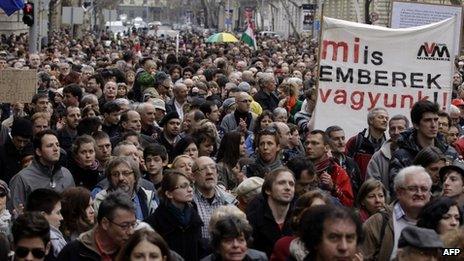Q&A: Hungary's controversial constitutional changes
- Published

Thousands supported Hungarian NGOs in protest against the changes to the new constitution
The Hungarian parliament has approved a controversial set of amendments to the country's new constitution.
Some of the amendments include provisions that have previously been deemed unconstitutional by the country's Constitutional Court.
Critics say that they will strengthen the power of the state, further cementing the governing conservative Fidesz party's position in public institutions, and damaging democracy by removing a number of checks and balances.
Prime Minister Viktor Orban maintains that the changes are necessary in order to complete the work of eradicating the legacy of Communism from Hungary. The constitution, enacted in January 2012, replaced one drafted in 1989, at a time when the country was emerging from 40 years of Communist rule.
What are the main provisions contained in the amendments?
One provision limits the power of the Constitutional Court and removes its right to strike out any laws that have already been enshrined in the constitution. Another lowers the retirement age for judges - a measure that critics say is designed to weed out non-pliable magistrates.
In the field of the media, there is an article restricting election campaigning to state media alone. Critics say that this will curb freedom of expression.
Several other provisions have been criticised as curtailing civil liberties. These include a requirement for students who have received state grants to stay and work in Hungary for a certain period of time after graduating, or pay back the cost of their tuition to the state.
Another article says that preference should be given to traditional (ie heterosexual) family relationships, and says that marriage and the parent-child relationship form the basis of the traditional family.
Why was the government able to introduce such sweeping changes?
In the 2010 election, a conservative coalition consisting of Mr Orban's Fidesz party and the Christian Democratic People's Party won two-thirds of the seats in parliament, and this powerful majority has made it possible for the governing parties to push through several pieces of controversial legislation.
Where have the main objections come from?
European institutions and the US government have all expressed concern over the changes, as have human rights organisations such as Amnesty International.
Reacting to the vote on Monday, European Commission President Jose Manuel Barroso said the adopted amendments "raise concerns with respect to the principle of the rule of law, EU law and Council of Europe standards" and the Commission would "make a detailed assessment" and act accordingly.
The European institution responsible for defending human rights, the Council of Europe, had urged Hungary to postpone the vote.
The US state department said that the changes threaten to undermine democratic governance in the country.
What about domestic opposition to the changes?
The main opposition Socialist Party boycotted the vote. The party is still struggling to recover from its devastating defeat in the 2010 election.
A protest by thousands of people in Budapest over the weekend against the constitutional amendments was organised by human rights groups.
Former President Laszlo Solyom - who helped to draft the 1989 constitution and served as the head of the Hungarian Constitutional Court from 1990 to 1998 - said in an open letter to the press on the day of the vote that the only way to stop the changes becoming irrevocable would be for President Janos Ader to refuse to sign the constitutional amendments into law.
Over the weekend the independent news website Origo ran an article headlined "Don't sign it, Janos!" and said anti-amendment demonstrations would continue outside his residence.
How has the government responded to the objections?
In a written response to Mr Barroso's telephone call, Mr Orban said that Hungary was "fully committed" to European standards. On Monday, Mr Barroso repeated that the Commission expects the Hungarian authorities to "engage in bilateral contacts with the European institutions in order to address any concerns raised as to the compatibility of these amendments with European principles and EU law."
And Gergely Gulyas, the deputy leader of the Fidesz parliamentary group, told the right-wing daily Magyar Nemzet that the government saw no reason to put off the vote despite "domestic and international kerfuffle".
"It's natural for the governing majority to make use of the authority it received in democratic elections," he said.
BBC Monitoring , externalselects and translates news from radio, television, press, news agencies and the internet from 150 countries in more than 70 languages. It is based in Caversham, UK, and has several bureaux abroad.
- Published11 March 2013
- Published4 January 2013
